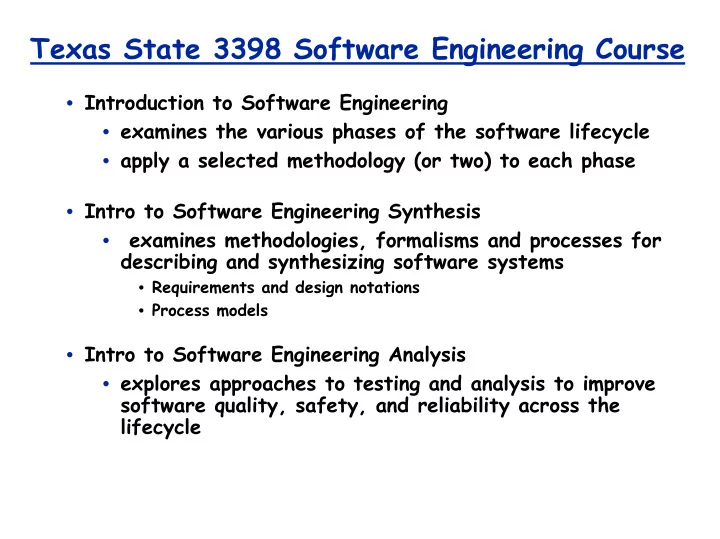

Texas State 3398 Software Engineering Course • Introduction to Software Engineering • examines the various phases of the software lifecycle • apply a selected methodology (or two) to each phase • Intro to Software Engineering Synthesis examines methodologies, formalisms and processes for • describing and synthesizing software systems • Requirements and design notations • Process models • Intro to Software Engineering Analysis • explores approaches to testing and analysis to improve software quality, safety, and reliability across the lifecycle
Prerequisites • Knowledge of a higher-level programming language • Java • Ada • C++ • C • Data structures • Some discrete mathematics • E.g., Graph theory, predicate logic, set theory
Synthesis Topics • The software crisis • The software qualities • Software development processes • Requirements engineering • Software architecture • Principles of software design • Configuration management
Testing & Analysis Topics • Theoretical foundations • Manual techniques • Software inspection • Cleanroom • Dynamic analysis • Assertions • Error seeding, mutation testing • Coverage criteria • Dependency analysis • Fault-based testing • Regression testing • Object oriented testing
Testing & Analysis Topics (continued) • Static analysis • Symbolic execution • Software verification • Data flow analysis • Interprocedural analysis • Specification based testing
Testing & Analysis Topics (continued) • Concurrency analysis • Safety and liveness • Reachability based analysis • Finite state verification • Experimental studies and s/w metrics • Overall concerns • Software safety, licensing, professionalism
Reading material • Required: • On the web • Suggested Readings • The Mythical Man-Month: Essays on Software Engineering by Frederick P. Brooks Jr ; Addison- Wesley Pub Co • Fundamentals of Software Engineering by Carlo Ghezzi, Mehdi Jazayeri, Dino Mandrioli; Prentice Hall
Flavor of Course • Combination of practical and theoretical approaches • First half of class focuses on software synthesis approaches • Second half of class focuses on analysis approaches • Reading material from the literature • Old “classics” • Promising new approaches • Discuss current industrial practices, “best” practices, “future” practices • New insight into software quality
Reading assignment • F. P. Brooks, Jr., "No Silver Bullet-- Essence and Accidents of Software Engineering," Computer 20(4), April 1987. Reprinted from Proceedings of the IFIP Congress, Dublin, Ireland, 1986.
Recommend
More recommend